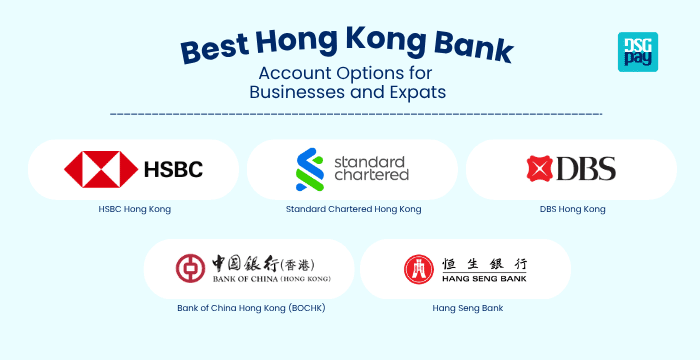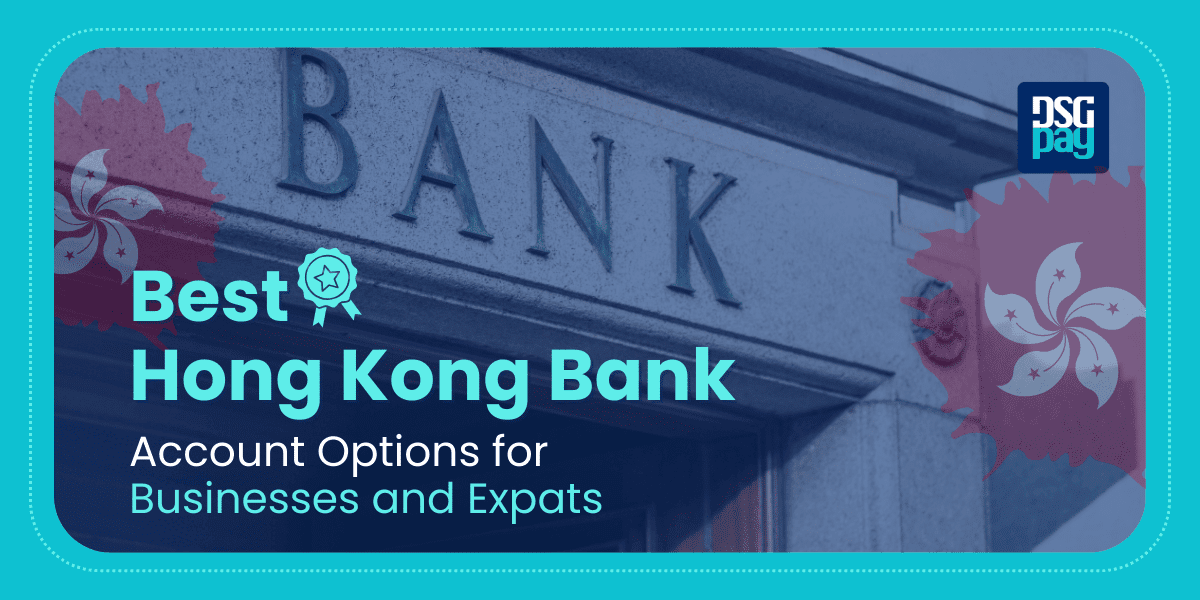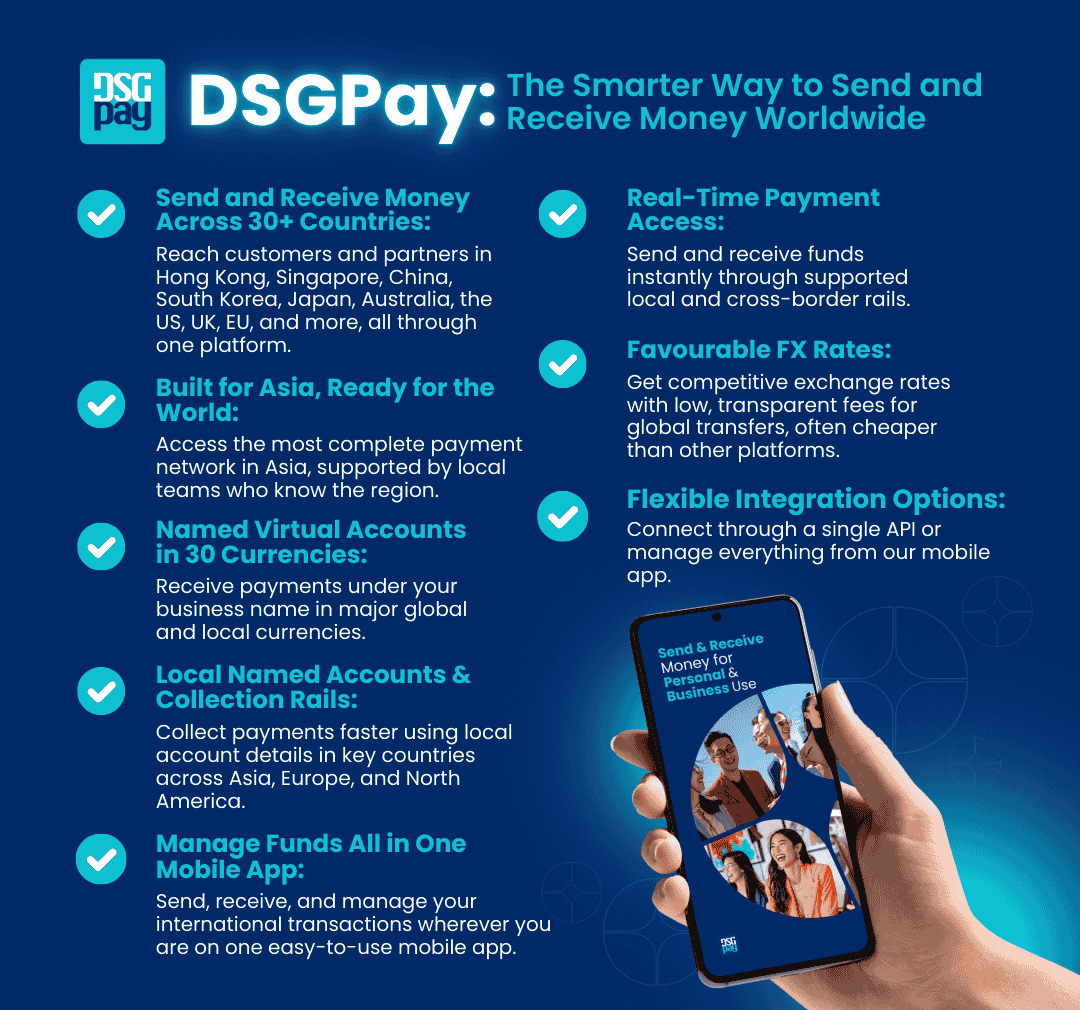Setting up a bank account in Hong Kong is a crucial step for anyone planning to live, work, or run a business in the city. However, the process can be complex, especially for non-residents and startups, involving detailed paperwork, mandatory in-person verification, and varying policies across different banks.
As Asia’s leading financial hub, Hong Kong is home to over 190 authorised banking institutions. While this provides ample choice, it can also make selecting the right bank challenging.
This guide outlines the best Hong Kong bank account options and key considerations for businesses and expats to manage their finances efficiently and confidently.
Table of Contents
Key Takeaways:
- Opening a Hong Kong bank account as a foreigner or business is possible, but requires prep, especially for non-residents and startups. Be ready with documents and patience.
- Business accounts need more paperwork, including company registration and identity verification. In-person or video calls are often required.
- Top banks like HSBC, Standard Chartered, DBS, BOCHK, and Hang Seng offer strong services but vary in digital features, fees, and multi-currency support.
- Key factors to consider include account type, fees, digital banking tools, customer support, and international transfer capabilities.
- Traditional banks often require in-person steps, but virtual banks simplify setup and cut through red tape for expats and online-first companies.
Can Foreigners Open a Hong Kong Bank Account?
Yes, though there are a few important details to keep in mind.
Opening a Personal Bank Account
Non-residents can open personal accounts in Hong Kong. Most banks have products designed for foreigners who aren’t permanent residents.
In general, you’ll need to show a valid passport or government-issued ID, along with proof of your current address. The requirements can vary depending on the bank, so it’s smart to check ahead and have your documents ready before applying.
Opening a Business Bank Account
If you’re looking to open a business bank account, expect more paperwork. In addition to your personal ID, you’ll need company registration documents. The process usually starts with booking an appointment and going through a preliminary review. Banks will also verify your identity and assess your business before they green-light your account.
Best Hong Kong Bank Account Options for Businesses and Expats

1. HSBC Hong Kong
To open a bank account in Hong Kong, HSBC stands out as a strong contender. Established in 1865, HSBC is a global banking leader known for its extensive international network and multi-currency accounts supporting HKD, USD, EUR, and more.
It offers robust online and mobile banking along with a wide range of financial products, making it ideal for businesses with cross-border needs. While fees are higher, HSBC’s reliability and global reach remain strong draws for many companies.
Pros:
- International banking services with a strong global presence for easy transfers.
- Potential for competitive savings interest rates based on account type and balance.
- Access to international ATMs worldwide (fees may apply).
- Expert support and dedicated services for expats and international clients.
- No monthly fees on select accounts like HSBC Premier for eligible customers.
Cons:
- Some accounts have high monthly fees unless minimum balances are maintained.
- Minimum opening deposits are required for some accounts.
- Foreign currency conversion rates may not always be competitive.
- Possible tax and regulatory considerations for international banking activities.
Fees:
| Service | Fee (HKD) |
| Account Opening | Usually free (Personal accounts) HKD 1,300 (Business accounts online) HKD 1,600 (Business accounts other channels) |
| Monthly Service Fee | Personal: HSBC One, Personal Integrated Account, Super Ease: HKD 0 HSBC Premier: HKD 0 if TRB ≥ HKD 1,000,000; otherwise HKD 380 Business: HKD 200 (Standard) HKD 450 (BusinessVantage account if balance < HKD 100,000) |
| Telegraphic Transfer (SWIFT) | HKD 120 – 240 |
| Inactive Account Fee | HKD 350 (inactive >1 year) HKD 450 (inactive >2 years) |
| Account Closure Fee | HKD 650 |
Note: Fees may vary; refer to HSBC’s official documentation for the most accurate information.
2. Standard Chartered Hong Kong
Standard Chartered specialises in serving SMEs and international businesses, offering multi-currency accounts across 11 currencies alongside seamless digital integration. It provides flexible financing options, making it a preferred choice for growing companies.
Although fees can be relatively high, its robust customer support and extensive cross-border capabilities continue to attract a wide range of clients.
Pros:
- Standard Chartered’s global presence simplifies international access and transfers.
- It offers strong online and mobile banking for easy transactions and remittances.
- The bank is experienced in opening accounts for foreign clients.
- It cares about environmental and social issues, which some investors like.
Cons:
- Higher fees for account opening, maintenance, and international transfers.
- Less competitive fee structure for smaller businesses.
- Complex application process, often requiring specific documents and branch visits.
Fees:
| Service | Fee (HKD) |
| Account Opening | Personal: Usually free Business: HKD 1,200 (local) / HKD 10,000 (overseas applicants) |
| Monthly Service Fee | Personal: HKD 75 if average daily balance < HKD 30,000 (fall-below fee) Priority Banking: waived if balance met, else HKD 900 quarterly fee Business: HKD 300 per month (BusinessOne account) |
| Telegraphic Transfer | HKD 120 – 200 |
| Corporate Credit Card Fee | HKD 1,800 annually |
Note: Additional charges may apply; consult Standard Chartered’s official resources for detailed information.
3. DBS Hong Kong
DBS is known for its digital-first approach, making it a top choice for opening a Hong Kong bank account, especially for tech-savvy businesses. It offers multi-currency accounts in 14 currencies and supports easy online account opening.
With user-friendly platforms and competitive fees, DBS stands out for its efficiency and innovation. While there are minimum balance requirements and higher fees for manual transfers, many users find the digital convenience worth it.
Pros:
- DBS is a trusted bank with a strong global presence.
- Provides a range of accounts for savings, business, and wealth management.
- Unlimited same-day fee-free local currency transfers to 42 countries.
- Supports RMB handling for cross-border trade with China.
Cons:
- Eligibility rules for foreigners can be complex.
- Customer support may be limited for foreign clients.
- Verification may require video calls or in-person meetings.
- Minimum balance requirements apply to some accounts.
Fees:
| Service | Fee (HKD) |
| Account Opening | Personal: FreeLocal Companies: HKD 1,200 Overseas & Special Companies: HKD 10,000 |
| Monthly Service Fee | HKD 250 (waived if average monthly balance > HKD 50,000) |
| Electronic Transfer Fees | Business: Online HKD 115; Branch HKD 200–380; SWIFT HKD 240 Personalbranch handling: HKD 250 (General), HKD 200 (Treasures) |
| Cable Charges | Usually HKD 100 per transfer; waived for Treasures customers |
| Correspondent Bank Fees | Up to HKD 400, depending on currency, charged to the sender |
Note: Fees may vary; refer to DBS’s official documentation for the most accurate information.
4. Bank of China Hong Kong (BOCHK)
BOCHK connects Hong Kong businesses with Mainland China through competitive multi-currency accounts and integrated cross-border banking. It’s favoured for regional connectivity, though higher fees and minimum deposits apply, especially for Mainland China companies.
Pros:
- Offers a wide range of financial products, including HK, China-A, and US stocks.
- Supports cross-border remittances and international payments for foreigners.
- Integrated services with HKD, foreign currencies, and QR Cash withdrawals.
- Rewards programs and customer benefits are available.
Cons:
- Stricter documentation and background checks for foreigners.
- Higher fees on international and foreign currency transactions.
- Language barriers at some branches may cause communication issues.
- Potential tax reporting requirements for foreign accounts.
Fees:
| Service | Fee (HKD) |
| Account Opening | HKD 1,200-6,200 (company) HKD 200-10,000 (personal) |
| Monthly Service Fee | HKD 60 if consolidated average balance < 5,000; waived if ≥ 5,000 |
| Telegraphic Transfer | HKD 100 per transfer (SWIFT confirmation) |
| SWIFT Charges | HKD 220 + bank fees for changes or cancellations; HKD 15–120 for foreign transfers |
Note: Fees may vary; consult BOCHK’s official resources for detailed information.
5. Hang Seng Bank
Hang Seng is a trusted option for businesses opening a Hong Kong bank account, especially local SMEs. It offers multi-currency accounts and integrates well with Hong Kong’s payment systems. It’s a solid choice for those who prioritise stability and hands-on support. While it may not offer all the digital features of larger international banks, it makes up for it with reliable customer service and a strong local presence.
Pros:
- Offers various rewards programs for credit cardholders and preferred customers.
- Provides comprehensive services like deposits, savings, time deposits, and forex.
- Strong reputation and local presence in Hong Kong.
- Focused on improving digital banking and mobile cash withdrawal.
Cons:
- Potential hidden costs, such as less favourable foreign exchange rates.
- Strict KYC/AML rules may require extra paperwork and verification.
- Limited international presence and global account access.
- Some services may be hard to access from outside Hong Kong.
- The narrower range of financial products compared to bigger banks.
Fees:
| Service | Fee (HKD) |
| Account Opening | Personal: HKD 65-270 Business: HKD 1,000-1,300 |
| Monthly Service Fee | From HKD 200; often waived with minimum balances (HKD 50,000 to HKD 100,000 depending on account) |
| Telegraphic Transfer | HKD 65 (online) HKD 190–260 (branch) |
| Inactive Account Fee | HKD 150–250 (if low balance and no activity) |
Note: Fees may vary; refer to Hang Seng’s official documentation for the most accurate information.

How to Open a Bank Account in Hong Kong: A Step-by-Step Guide
Step 1: Book a Call (or Walk In)
Start by reaching out to the bank, whether by email, phone, or in person. This step helps you understand exactly what documents and steps are needed, so there are no surprises later.
Step 2: Quick Background Check
When opening a Hong Kong bank account, you’ll go through a basic screening. Some banks may call, others send a form, and a few might ask for an in-person meeting. It’s just their way of checking your eligibility and suggesting the right type of account.
Step 3: Bring the Right Documents
If you’re applying as an individual:
- Passport or HKID (Hong Kong Identity Card)
- Proof of address (utility bill, lease, etc.)
- Visa/work permit (if non-resident)
- Employment or income proof (sometimes required)
For businesses:
- Certificate of Incorporation & Business Registration
- Articles of Association
- Director/shareholder ID and address proof
- Business address proof
- Board resolution to open the account
- Certificate of Incumbency
- Business plan and source of funds
Tip: Submitting all required documents upfront helps reduce delays and speeds up approval.
Step 4: Compliance Checks (KYC & AML)
To open a bank account in Hong Kong, banks are required to conduct regulatory due diligence to verify your identity and assess potential fraud risks. This is a standard but mandatory part of the onboarding process.
Step 5: You’re In
Once everything clears, your account is set up. You’ll get login details, access info, and you’re good to go.
Considerations When Choosing a Bank in Hong Kong
When selecting a Hong Kong bank account, ensure it ticks the right boxes for your needs.
Here’s what to look out for:
- Account Types That Align with Your Objectives: If you need a savings account, run a business, or make international transfers, choose a bank that offers the right type of account, such as personal, business, multi-currency, or investment.
- Transparent Fee Structure: Monthly charges, transaction fees, and penalties for low balances can add up. Ask about them upfront to avoid any issues later.
- Digital Banking Experience: A reputable Hong Kong bank account should offer seamless online and mobile banking services. If the digital platform feels outdated or difficult to navigate, you should consider alternative options.
- Multi-Currency Support: If you operate across countries or get paid in different currencies, make sure the bank supports that, and check their exchange rates while you’re at it.
- International Transfer Fees and Processing Times: The cost to send money abroad and the speed of transfer are important factors if you frequently move funds across borders.
- Reliable Customer Support: When issues arise, prompt and effective assistance is essential. Choose a bank with a strong reputation for responsive and helpful customer service.
Can You Open a Hong Kong Bank Account Online?
Most traditional banks in Hong Kong, including HSBC, allow you to begin your application online; however, you will still need to visit a branch for identity verification.
If you prefer a fully online process, virtual banks like ZA Bank, WeLab Bank, Livi Bank, and Fusion Bank are popular options.
These virtual banks typically offer faster onboarding, modern mobile apps, and lower fees, making them ideal for businesses and expats seeking convenience.
In all cases, you will need to provide documents such as your passport, proof of address, and possibly proof of income.
Explore Virtual Alternatives to a Traditional Hong Kong Bank Account
For many expats and international businesses, opening a traditional bank account in Hong Kong can be time-consuming and restrictive. That’s where virtual accounts come in.
These digital alternatives offer faster setup, remote onboarding, and global payment capabilities without the paperwork or in-person visits.
You still get many of the same functions you’d expect from a traditional bank account, but with more flexibility and lower operational barriers.
If you need a way to collect and send payments across borders without the typical banking delays, a virtual account might be the right fit.
Simplify Global Payments with DSGPay’s Multi-Currency Virtual Account
Whether you’re a Hong Kong SME expanding internationally or a global business looking to manage Asian currency flows, DSGPay gives you a smarter way to handle cross-border payments.

With DSGPay, you can:
- Open a Global Named Account: Send and receive payments in your own business name across multiple currencies.
- Hold and Convert 30+ Currencies: Manage popular currencies across Asia, Europe, and the Americas, all from a single dashboard.
- Built for Global Businesses: Ideal for SMEs, freelancers, and online-first companies who need efficient, real-time global transfers.
- Licensed & Regulated in Hong Kong: Operates under strict AML and compliance standards as a licensed Money Service Operator (MSO).
- Remote, Paperless Onboarding: Open your account fully online, no branch visits required.
- Transparent Pricing: Competitive FX rates, no minimum balances, and no hidden fees.
- Track and manage everything in real time through a simple mobile app or API
DSGPay combines flexibility, speed, and compliance to help you manage international payments more effectively, whether you’re sending, receiving, or holding funds across markets.




